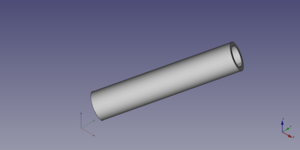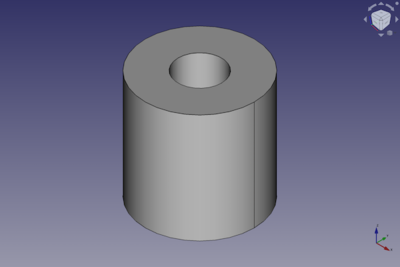Part Tube: Difference between revisions
mNo edit summary |
(Undo revision 1222498 by David69 (talk)The Part_Tube command works differently. You can specify the dimensions in the initial task panel.) Tag: Undo |
||
| (23 intermediate revisions by 3 users not shown) | |||
| Line 1: | Line 1: | ||
<languages/> |
<languages/> |
||
{{UnfinishedDocu{{#translation:}}}} |
|||
<translate> |
<translate> |
||
| Line 19: | Line 18: | ||
|Workbenches=[[Part_Workbench|Part]] |
|Workbenches=[[Part_Workbench|Part]] |
||
|Version=0.19 |
|Version=0.19 |
||
|SeeAlso=[[ |
|SeeAlso=[[Part_Primitives|Part Primitives]] |
||
}} |
}} |
||
| Line 25: | Line 24: | ||
<!--T:4--> |
<!--T:4--> |
||
The [[Image:Part_Tube.svg|24px]] '''Part Tube''' command creates a parametric tube solid. In the coordinate system defined by its {{PropertyData|Placement}} property, the bottom face of the tube lies on the XY plane with its center at the origin. |
|||
The Tube command inserts a tube into the active document. The tube is geometrically treated as a cut of a smaller cylinder into a larger one. By default, the command will insert a 10 mm high tube with an outer radius of 5 mm and an inner radius of 2 mm. These parameters can be modified after the object has been added. |
|||
</translate> |
|||
<!--T:5--> |
|||
[[Image: |
[[Image:Part_Tube_Example.png|400px]] |
||
<translate> |
|||
==Usage== <!--T:6--> |
==Usage== <!--T:6--> |
||
=== Create === <!--T:15--> |
|||
<!--T:7--> |
<!--T:7--> |
||
# There are several ways to invoke the command: |
|||
To create a tube either: |
|||
* |
#* Press the {{Button|[[Image:Part_Tube.svg|16px]] [[Part_Tube|Part Tube]]}} button. |
||
* |
#* Select the {{MenuCommand|Part → Primitives → [[Image:Part_Tube.svg|16px]] Create tube}} option from the menu. |
||
# The {{MenuCommand|Tube}} task panel opens and a preview of the tube is displayed in the [[3D_view|3D view]]. |
|||
# Specify the dimensions. |
|||
# The preview is dynamically updated. |
|||
# Press the {{Button|OK}} button. |
|||
# The tube is created. |
|||
# Optionally change the {{PropertyData|Placement}} of the tube in the [[Property_editor|Property editor]], or with the [[Image:Std_TransformManip.svg|16px]] [[Std_TransformManip|Std TransformManip]] command. |
|||
<!--T: |
=== Edit === <!--T:16--> |
||
To edit the tube: |
|||
* either |
|||
** select it in the tree and double-click on it |
|||
** edit the parameters in the appearing dialog |
|||
* or use the the [[Property_editor|property editor]] to edit the parameters |
|||
<!--T:17--> |
|||
== Example == |
|||
# Double-click the tube in the [[Tree_view|Tree view]] |
|||
# The {{MenuCommand|Tube}} task panel opens. |
|||
# Change one or more dimensions. |
|||
# The tube is dynamically updated in the [[3D_view|3D view]]. |
|||
# Press the {{Button|OK}} button. |
|||
== Example == <!--T:18--> |
|||
[[File:Part Tube Scripting Example.png|thumb|Part Tube scripting example.]] |
|||
<!--T:19--> |
|||
A Part Tube object with the values of the bottom scripting example are shown here. |
|||
[[Image:Part_Tube_Scripting_Example.png|thumb|Part Tube from the scripting example]] |
|||
<!--T:20--> |
|||
A Part Tube object created with the [[#Scripting|scripting example]] below is shown here. |
|||
==Properties== <!--T:9--> |
==Properties== <!--T:9--> |
||
<!--T:21--> |
|||
See also: [[Property_editor|Property editor]]. |
|||
<!--T: |
<!--T:22--> |
||
A Part Tube object is derived from a [[Part_Feature|Part Feature]] object and inherits all its properties. It also has the following additional properties: |
|||
* Via the [[Property_editor|Property Editor]]: |
|||
** {{PropertyData|Placement}}: Specifies the orientation and position of the Box in the 3D space. See [[Placement|Placement]]. The reference point is the left front lower corner of the box. |
|||
=== Data === <!--T:23--> |
|||
** {{PropertyData|Label}}: The Label is the name given to the operation. This name can be changed at your convenience. |
|||
<!--T:24--> |
|||
{{TitleProperty|Attachment}} |
|||
<!--T:25--> |
|||
The object has the same attachment properties as a [[Part_Part2DObject#Data|Part Part2DObject]]. |
|||
<!--T:26--> |
|||
{{TitleProperty|Tube}} |
{{TitleProperty|Tube}} |
||
* {{PropertyData|Height|Length}}: Sets the height (default is 10 mm). |
|||
<!--T:10--> |
|||
* {{PropertyData|Inner Radius|Length}}: Set the inner radius (default is 2 mm). |
|||
* {{PropertyData| |
* {{PropertyData|Height|Length}}: The height of the tube. The default is {{Value|10mm}}. |
||
* {{PropertyData|Inner Radius|Length}}: The inner radius of the tube. Must be smaller than {{PropertyData|Outer Radius}}. Can be {{Value|0}}. The default is {{Value|2mm}}. |
|||
* {{PropertyData|Outer Radius|Length}}: The outer radius of the tube. Must be larger than {{PropertyData|Inner Radius}}. The default is {{Value|5mm}}. |
|||
== Scripting == <!--T:12--> |
== Scripting == <!--T:12--> |
||
<!--T:27--> |
|||
See also: [https://freecad.github.io/SourceDoc/ Autogenerated API documentation], [[Part_scripting|Part scripting]] and [[FreeCAD_Scripting_Basics|FreeCAD Scripting Basics]]. |
|||
<!--T:13--> |
<!--T:13--> |
||
A Part Tube can be created with the |
A Part Tube can be created with the {{Incode|addTube()}} method ({{Version|0.20}}) of the Shapes module: |
||
</translate> |
</translate> |
||
{{Code|code= |
{{Code|code= |
||
tube = Shapes.addTube(FreeCAD.ActiveDocument, "myTube") |
|||
from BasicShapes import Shapes |
|||
from BasicShapes import ViewProviderShapes |
|||
tube = FreeCAD.ActiveDocument.addObject("Part::FeaturePython", "myTube") |
|||
Shapes.TubeFeature(tube) |
|||
ViewProviderShapes.ViewProviderTube(tube.ViewObject) |
|||
}} |
}} |
||
<translate> |
<translate> |
||
<!--T:14--> |
<!--T:14--> |
||
* Where {{Incode|myTube}} is the name for the object |
* Where {{Incode|"myTube"}} is the name for the object. |
||
* The function returns the newly created object. |
* The function returns the newly created object. |
||
<!--T:28--> |
|||
You have to [[Std Refresh|recompute]] the current document with |
|||
Example: |
|||
</translate> |
|||
{{Code|code= |
{{Code|code= |
||
import FreeCAD as App |
|||
App.activeDocument().recompute(None,True,True) |
|||
from BasicShapes import Shapes |
|||
}} |
|||
doc = App.activeDocument() |
|||
to see the tube. |
|||
tube = Shapes.addTube(FreeCAD.ActiveDocument, "myTube") |
|||
The {{Incode|Label}} is the user editable name for the object. It can be easily changed by |
|||
</translate> |
|||
{{Code|code= |
|||
tube.Label = "new myTubeName" |
|||
}} |
|||
<translate> |
|||
<!--T:28--> |
|||
You can access and modify attributes of the {{Incode|box}} object. For example, you may wish to modify the length, width and height parameters. |
|||
</translate> |
|||
{{Code|code= |
|||
tube.Height = 20 |
tube.Height = 20 |
||
tube.InnerRadius = 2 |
tube.InnerRadius = 2 |
||
tube.OuterRadius = 3 |
tube.OuterRadius = 3 |
||
tube.Placement = App.Placement(App.Vector(2, 4, 5), App.Rotation(60, 60, 30)) |
|||
}} |
|||
<translate> |
|||
doc.recompute() |
|||
<!--T:31--> |
|||
You can change its placement with: |
|||
</translate> |
|||
{{Code|code= |
|||
tube.Placement = FreeCAD.Placement(FreeCAD.Vector(1, 2, 3), FreeCAD.Rotation(60, 60, 30)) |
|||
}} |
}} |
||
<translate> |
<translate> |
||
| Line 133: | Line 136: | ||
</translate> |
</translate> |
||
{{ |
{{Part_Tools_navi{{#translation:}}}} |
||
{{Userdocnavi{{#translation:}}}} |
{{Userdocnavi{{#translation:}}}} |
||
Latest revision as of 11:40, 21 January 2023
|
|
| Menu location |
|---|
| Part → Primitives → Create tube |
| Workbenches |
| Part |
| Default shortcut |
| None |
| Introduced in version |
| 0.19 |
| See also |
| Part Primitives |
Description
The Part Tube command creates a parametric tube solid. In the coordinate system defined by its DataPlacement property, the bottom face of the tube lies on the XY plane with its center at the origin.
Usage
Create
- There are several ways to invoke the command:
- Press the
Part Tube button.
- Select the Part → Primitives →
Create tube option from the menu.
- Press the
- The Tube task panel opens and a preview of the tube is displayed in the 3D view.
- Specify the dimensions.
- The preview is dynamically updated.
- Press the OK button.
- The tube is created.
- Optionally change the DataPlacement of the tube in the Property editor, or with the
Std TransformManip command.
Edit
- Double-click the tube in the Tree view
- The Tube task panel opens.
- Change one or more dimensions.
- The tube is dynamically updated in the 3D view.
- Press the OK button.
Example

A Part Tube object created with the scripting example below is shown here.
Properties
See also: Property editor.
A Part Tube object is derived from a Part Feature object and inherits all its properties. It also has the following additional properties:
Data
Attachment
The object has the same attachment properties as a Part Part2DObject.
Tube
- DataHeight (
Length): The height of the tube. The default is10mm. - DataInner Radius (
Length): The inner radius of the tube. Must be smaller than DataOuter Radius. Can be0. The default is2mm. - DataOuter Radius (
Length): The outer radius of the tube. Must be larger than DataInner Radius. The default is5mm.
Scripting
See also: Autogenerated API documentation, Part scripting and FreeCAD Scripting Basics.
A Part Tube can be created with the addTube() method (introduced in version 0.20) of the Shapes module:
tube = Shapes.addTube(FreeCAD.ActiveDocument, "myTube")
- Where
"myTube"is the name for the object. - The function returns the newly created object.
Example:
import FreeCAD as App
from BasicShapes import Shapes
doc = App.activeDocument()
tube = Shapes.addTube(FreeCAD.ActiveDocument, "myTube")
tube.Height = 20
tube.InnerRadius = 2
tube.OuterRadius = 3
tube.Placement = App.Placement(App.Vector(2, 4, 5), App.Rotation(60, 60, 30))
doc.recompute()
- Primitives: Box, Cylinder, Sphere, Cone, Torus, Tube, Create primitives, Shape builder
- Creation and modification: Extrude, Revolve, Mirror, Fillet, Chamfer, Make face from wires, Ruled Surface, Loft, Sweep, Section, Cross sections, 3D Offset, 2D Offset, Thickness, Projection on surface, Attachment
- Boolean: Make compound, Explode Compound, Compound Filter, Boolean, Cut, Fuse, Common, Connect, Embed, Cutout, Boolean fragments, Slice apart, Slice, XOR
- Measure: Measure Linear, Measure Angular, Measure Refresh, Clear All, Toggle All, Toggle 3D, Toggle Delta
- Getting started
- Installation: Download, Windows, Linux, Mac, Additional components, Docker, AppImage, Ubuntu Snap
- Basics: About FreeCAD, Interface, Mouse navigation, Selection methods, Object name, Preferences, Workbenches, Document structure, Properties, Help FreeCAD, Donate
- Help: Tutorials, Video tutorials
- Workbenches: Std Base, Arch, Assembly, CAM, Draft, FEM, Inspection, Mesh, OpenSCAD, Part, PartDesign, Points, Reverse Engineering, Robot, Sketcher, Spreadsheet, Surface, TechDraw, Test Framework
- Hubs: User hub, Power users hub, Developer hub
